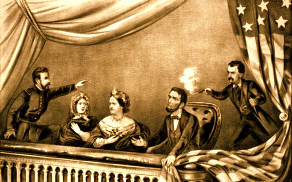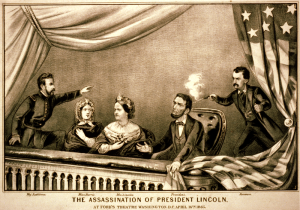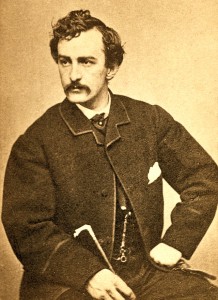The Assassination of Abraham Lincoln

American Experience – The Assassination of Abraham Lincoln (PBS Documentary)
American Experience – The Assassination of Abraham Lincoln (PBS Documentary).
 The Assassination of President Lincoln (Currier & Ives, 1865), from left to right: Major Henry Rathbone, Clara Harris, Mary Todd Lincoln, Abraham Lincoln, and John Wilkes Booth This print gives the impression that Rathbone saw Booth enter the box and had already risen as Booth fired his weapon. In reality, Rathbone was unaware of Booth’s approach and reacted after the shot was fired.
The Assassination of President Lincoln (Currier & Ives, 1865), from left to right: Major Henry Rathbone, Clara Harris, Mary Todd Lincoln, Abraham Lincoln, and John Wilkes Booth This print gives the impression that Rathbone saw Booth enter the box and had already risen as Booth fired his weapon. In reality, Rathbone was unaware of Booth’s approach and reacted after the shot was fired.
United States President Abraham Lincoln was shot on Good Friday, April 14, 1865, while attending the play, Our American Cousin, at Ford’s Theatre as the American Civil War was drawing to a close. The assassination occurred five days after the commander of the Confederate Army of Northern Virginia, General Robert E. Lee, surrendered to Lieutenant General Ulysses S. Grant and the Union Army of the Potomac.
Lincoln was the first American president to be assassinated. An unsuccessful attempt had been made on Andrew Jackson 30 years before in 1835, and Lincoln had himself been the subject of an earlier assassination attempt by an unknown assailant in August 1864. The assassination of Lincoln was planned and carried out by the well-known stage actor John Wilkes Booth, as part of a larger conspiracy in a bid to revive the Confederate cause.
Booth’s three co-conspirators were Lewis Powell and David Herold, who were assigned to kill Secretary of State William H. Seward, and George Atzerodt who was tasked to kill Vice President Andrew Johnson. By simultaneously eliminating the top three people in the administration, Booth and his co-conspirators hoped to sever the continuity of the United States government. Lincoln was shot while watching the play Our American Cousin with his wife Mary Todd Lincoln at Ford’s Theatre in Washington, D.C.. He died early the next morning. The rest of the conspirators’ plot failed; Powell only managed to wound Seward, while Atzerodt, Johnson’s would-be assassin, lost his nerve and fled. The funeral and burial of Abraham Lincoln was a period of national mourning.
Original Plan: Kidnapping the President
In late 1860, Booth had been initiated in the pro-Confederate Knights of the Golden Circle in Baltimore.
In March 1864, Ulysses S. Grant, the commanding general of all the Union’s armies, decided to suspend the exchange of prisoners-of-war. As harsh as it may have been on the prisoners of both sides, Grant realized the exchange was prolonging the war by returning soldiers to the outnumbered and manpower-starved South. John Wilkes Booth, a Southerner and outspoken Confederate sympathizer, conceived a plan to kidnap President Lincoln and deliver him to the Confederate Army, to be held hostage until the North agreed to resume exchanging prisoners. Booth recruited Samuel Arnold, George Atzerodt, David Herold, Michael O’Laughlen, Lewis Powell (also known as “Lewis Paine”), and John Surratt to help him. Surratt’s mother, Mary Surratt, left her tavern in Surrattsville, Maryland, and moved to a house in Washington, D.C., where Booth became a frequent visitor.
While Booth and Lincoln did not know each other, Lincoln did know about Booth and enjoyed watching him perform at Ford’s Theatre.
Lincoln watched Booth perform in numerous plays, including one called the Marble Heart at Ford’s Theatre on November 9, 1863. The Washington Chronicle called it a “beautiful emotional play” and Booth earned rave reviews for his role in the production. According to the book Lincoln’s Sanctuary: Abraham Lincoln And The Soldiers’ Home, Lincoln enjoyed Booth’s performance so much he sent a note backstage inviting him to the White House so they could meet. Booth, a rebel sympathizer and Confederate spy, evaded the president’s invitation. Booth didn’t give Lincoln a specific reason why he couldn’t visit but he later told his friends “I would rather have the applause of a Negro to that of the president!” According to the book Inside Lincoln’s White House, the actor Frank Mordaunt later corroborated this story:
“Lincoln was an admirer of the man who assassinated him. I know that, for he said to me one day that there was a young actor over in Ford’s Theater whom he desired to meet, but that the actor had on one pretext or another avoided any invitations to visit the White House. That actor was John Wilkes Booth.”
http://en.wikipedia.org/wiki/Assassination_of_Abraham_Lincoln


